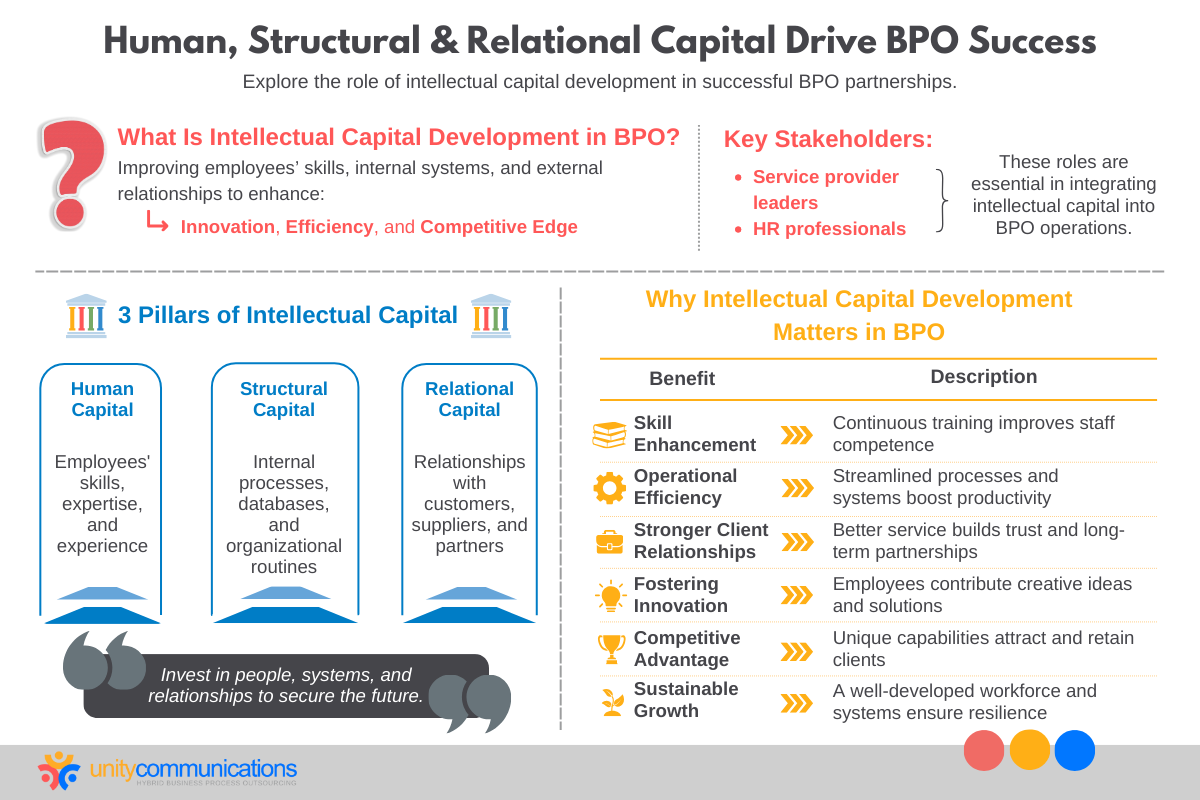Table of Contents
Intellectual capital development is vital for outsourcing firms’ sustained success. Prioritizing it boosts innovation and efficiency, helping companies thrive in the dynamic business process outsourcing (BPO) sector, which has grown significantly due to its positive impact on company performance.
Stay on this page to learn more about the integral relationship between a BPO company’s success and intellectual capital development. This article also explores the strategies for building and developing this vital growth resource.
BPO and intellectual capital development: Recipe for success

What is BPO, and how does intellectual capital development affect this process? Outsourcing involves delegating specific business operations to service providers, allowing companies to focus more on their core competencies. The BPO sector witnessed significant growth due to its positive impact on cost efficiency, productivity, and overall business performance.
Service provider leaders and human resource (HR) professionals must understand the integral relationship between a BPO company’s success and intellectual capital development.
Intellectual capital development in BPO means improving employee skills, organizational processes, and customer relationships to raise innovation, efficiency, and competitive advantage for long-term success.
Intellectual capital in outsourcing encompasses three primary components:
- Human capital refers to the skills, knowledge, and experience of employees.
- Structural capital includes processes, databases, and organizational routines supporting employee productivity.
- Relational capital involves the relationships with customers, suppliers, and partners that enhance business value.
Intellectual capital development in BPO is beneficial for the following reasons:
- Improves staff abilities and knowledge. Continuous training equips personnel with skills and expertise, making them more competent.
- Increases organizational efficiency. Optimizing procedures, databases, and routines through intellectual capital creation increases structural capital, boosts productivity, and streamlines operations.
- Strengthens customer relations. Developing relational capital through improved customer interactions helps BPO providers gain client trust, resulting in long-term partnerships and recurrent contracts.
- Promotes creativity and ingenuity. Focusing on intellectual capital enables employees to contribute new ideas and solutions, allowing BPO organizations to adapt and prosper in a changing market.
- Gains competitive advantage. Intellectual capital development provides BPO vendors with unique competencies that attract and retain clients.
- Supports long-term business success. Investing in human, structural, and relational capital sustains growth, ensuring BPO firms remain resilient to industry challenges.
How BPO providers can develop and grow intellectual capital
Consider the following strategies BPO enterprises utilize to foster and achieve intellectual capital development:
Training and development programs
Investing in comprehensive training and development programs is critical to improving human capital. BPO companies can upgrade service quality and innovation capabilities by constantly improving their employees’ knowledge and skills. Effective training initiatives should emphasize technical and soft skills to build a versatile staff.
Take these tips when conducting training and development programs:
- Identify training needs. Conduct a thorough assessment to identify skill gaps and training needs to create programs that enhance productivity and include human capital.
- Set clear objectives. Define measurable training goals that align with the company’s strategic objectives. They must also emphasize technical and soft skills for a well-rounded staff.
- Develop a comprehensive curriculum. Design an extensive training curriculum covering technical skills such as data analysis, customer service, and soft skills (e.g., communication, teamwork, and problem-solving).
- Leverage technology and tools. Advanced technologies, such as learning management systems (LMS), online courses, and virtual reality simulations, offer employees dynamic and adaptable learning options.
- Utilize diverse training methods. Apply various training methods, including classroom instruction, e-learning, workshops, on-the-job training, and simulations, to accommodate diverse learning styles and enhance engagement.
- Incorporate real-world scenarios. Add actual situations and case studies to help workers employ theoretical knowledge practically, enhancing problem-solving skills and readiness for real-world challenges.
Knowledge management systems (KMS)
Implementing robust KMS is crucial for capturing, storing, and sharing organizational knowledge. These platforms enable the exchange of best practices and essential information, promoting continual learning and progress.
Use the following pointers when deploying KMS:
- Assess organizational needs. Determine knowledge gaps and organizational requirements. Understand what information and practices are critical for enhancing service delivery and innovation within the BPO firm.
- Select the right system. Choose a KMS that fits the company’s size, industry needs, and tech infrastructure. Consider scalability, usability, and integration with existing tools.
- Define knowledge taxonomy. Establish a transparent classification system for organizing knowledge within the KMS. Categorize information based on relevance, departments, and types of expertise (e.g., technical procedures, customer insights).
- Capture and document knowledge. Encourage staff to contribute best practices, lessons learned, and innovations in the KMS via templates for consistency and accessibility.
- Provide convenient access. Keep the KMS accessible from all locations and departments. Include search and navigation options and role-based user rights.
- Encourage knowledge sharing. Create a culture of knowledge exchange by recognizing contributors and fostering cooperation via forums, discussion boards, and virtual gatherings for idea exchange.
Mentorship and coaching
Mentorship and coaching sessions help transmit knowledge and expertise from experienced employees to new hires. These programs develop human capital and improve company culture and employee engagement.
The following tactics in mentorship and coaching help BPO companies promote and attain intellectual capital development:
- Identify potential mentors. Choose employees with leadership qualities committed to sharing their expertise as mentors.
- Establish clear goals. List objectives for the mentorship program aligned with the company’s strategic priorities and intellectual capital goals.
- Match mentors and mentees. Pair mentors and mentees based on their professional goals, skills gaps, and personality compatibility.
- Set up structured sessions. Schedule organized mentoring sessions with clear agendas focused on skill development, career advancement, and knowledge transfer.
- Provide feedback and support. Facilitate feedback sessions between mentors and mentees to track progress and offer support for skill development and strategy implementation.
- Celebrate achievements. Recognize and celebrate achievements and milestones reached through mentorship. Highlight success stories where intellectual capital growth has improved business outcomes or innovative solutions.
Encouraging innovation
Promoting innovation fosters creativity and enhances competitive advantage, which is crucial for intellectual capital development in BPO firms.
Utilize these guidelines to encourage innovation:
- Cultivate a supportive environment. Promote a culture of creativity by fostering open communication, risk-taking, and experimentation. Offer employees resources and time to explore new ideas without worrying about failure.
- Establish innovation labs. Designate rooms or times for innovation labs where employees can think, develop, and experiment with new ideas. Include tools and technologies to create an environment conducive to creativity.
- Host hackathons. Conduct hackathons regularly to challenge teams to create solutions quickly. Encourage cross-functional collaboration and diverse solutions to spark creativity.
- Implement idea submission platforms. Launch digital platforms or portals where employees can submit and discuss ideas. Ensure transparency in the evaluation process and provide feedback to contributors for continuous improvement.
- Encourage cross-functional collaboration. Facilitate cross-departmental coordination to leverage diverse expertise, encourage knowledge sharing, and advance interdisciplinary approaches to solving challenges.
- Provide training and workshops. Offer instructions on innovation techniques, design thinking, and creative problem-solving to equip employees with skills for generating and refining ideas.
Collaborative projects
Working with clients, partners, or other divisions can dramatically boost intellectual capital. These projects allow stakeholders to exchange information, learn from different viewpoints, and collaboratively address complicated challenges.
The following procedures for collaborative projects aid BPO providers in fostering and enhancing intellectual capital development:
- Identify strategic partnerships. Choose partners, clients, or internal divisions based on complementary strengths and common goals. For example, if a client wants to enter new markets, its goals include training employees on international regulations and cultural competencies.
- Set up a collaborative framework. Develop a structured framework outlining each participant’s responsibilities and timelines. Clarify communication channels and decision-making processes to facilitate efficient collaboration.
- Implement agile methodologies. Adopt agile methodologies for quick adaptation to changing requirements and improved project outcomes. Encourage iterative feedback and rapid prototyping to boost innovation and problem-solving.
- Encourage diversity of thought. Embrace different perspectives and interdisciplinary approaches in teams. Test assumptions, explore new ideas, and propose innovative solutions to complex challenges.
- Monitor progress and adjust. Regularly monitor project progress against established milestones and objectives. Conduct periodic reviews to identify potential roadblocks or areas needing adjustment, ensuring project success and intellectual capital growth.
Leveraging technology and automation
Investing in modern technology and automation solutions builds structural capital by simplifying operations and improving efficiency. BPO tech tools enable staff to focus on higher-value jobs, increasing overall productivity and innovation within the organization.
Follow the procedures below to leverage technology and automation effectively:
- Analyze technological needs. Assess current processes to identify where technology can streamline operations and enhance productivity. Prioritize investments aligned with strategic goals and intellectual capital objectives.
- Spend on robust technology solutions. Select artificial intelligence (AI), machine learning (ML), robotic process automation (RPA), and cloud computing solutions that fit BPO needs. Scale solutions for growth and innovation.
- Automate repetitive tasks. Identify and automate repetitive tasks to free up time for higher-value activities. Use automation tools to enhance accuracy, efficiency, and speed.
- Integrate systems for seamless operations. Unify software systems for seamless data flow and department communication. Enable real-time collaboration and access to critical information for informed decisions.
- Provide training and upskilling. Offer training to familiarize employees with new technologies and automation tools, empowering them to innovate and enhance overall intellectual capital.
Enhancing client relationships
Putting resources into relationship management tools and tactics drives relational capital by strengthening client relationships. Regular client feedback sessions, specialized service offerings, and proactive communication promote confidence and commitment, resulting in long-term partnerships and corporate growth.
Comply with these recommendations to enhance client relationships:
- Implement relationship management tools. Invest in advanced customer relationship management (CRM) systems to track client interactions, preferences, and feedback. Use data-driven insights to individualize services and anticipate their needs.
- Conduct regular client feedback sessions. Schedule periodic surveys to gather input on service satisfaction, expectations, and areas for improvement. Act on feedback promptly to demonstrate responsiveness and commitment.
- Offer specialized service offerings. Tailor services to meet specific client needs and industry demands. Develop specialized solutions that add value and differentiate your services in the market.
- Ensure proactive communication. Maintain continuous client communication with updates, progress reports, and proactive issue resolution to foster trust and reliability.
- Personalize client interactions. Understand each client’s distinct business challenges and goals. Customize conversations to address individual preferences and personalize the client’s experience.
- Build long-term partnerships. Focus on nurturing long-lasting relationships based on trust and transparency. Offer loyalty programs or incentives to reward client loyalty and encourage repeat business.
Issues for BPO firms and leaders in intellectual capital development

Several BPO challenges can impede firms from building and boosting intellectual capital development. Below, we explore these issues and their recommended solutions:
Management of intellectual capital
Effective intellectual capital management entails carefully measuring, assessing, and utilizing intangible assets. However, many BPO companies suffer due to a lack of standardized measurements and frameworks. Without precise rules, they might not correctly measure intellectual capital and its effects.
Recommended solutions: Use standardized measurements and frameworks to gauge, analyze, and leverage intellectual capital. Invest in training and technology to manage the organization consistently and effectively.
HR constraints
BPO firms frequently encounter personnel issues, such as high turnover rates, skill shortages, and insufficient training programs. These challenges prevent human capital growth, an essential component of intellectual capital.
Recommended solutions: Provide comprehensive training and development programs centered on technical and soft skills. Develop a culture of continual education and invest in employee retention to establish a stable and skilled team.
Impact of intellectual capital on performance
Understanding the impact of intellectual capital on business performance is essential. International journals and research find that intellectual capital, including human capital, significantly improves business performance. However, BPO firms often struggle to quantify this impact.
Recommended solutions: Use structural equation modeling and other advanced analytical tools to assess the relationship between intellectual capital and business performance. Regularly review and adjust strategies based on these insights.
Technological integration
Integrating sophisticated technologies is critical to generating intellectual capital in the information technology industry, a segment the outsourcing sector relies on for its innovation. However, many BPO organizations are slow to adopt cutting-edge technologies, limiting intellectual capital expansion.
Recommended solutions: Put resources into current technology and automation solutions to improve operations and efficiency. Implement effective KMS for capturing, storing, and sharing organizational knowledge.
Cultural and organizational barriers
Cultural and organizational barriers, such as resistance to change and lack of collaboration, can obstruct your efforts. They prevent the effective utilization of developed intellectual capital and hinder the sharing of knowledge and experience.
Recommended solutions: Foster a culture that values and rewards innovation and knowledge sharing. Encourage open communication, collaboration, and continuous improvement to overcome these barriers.
The bottom line

Investing in intellectual capital enhances innovation, efficiency, and competitive advantage. Prioritizing this aspect fosters a skilled workforce, optimizes processes, and strengthens client relationships, ensuring resilience and sustainability.
Let’s connect to learn more about BPO and intellectual capital development. Unity Communications can help you implement effective strategies to enhance your business performance and achieve sustainable growth.




